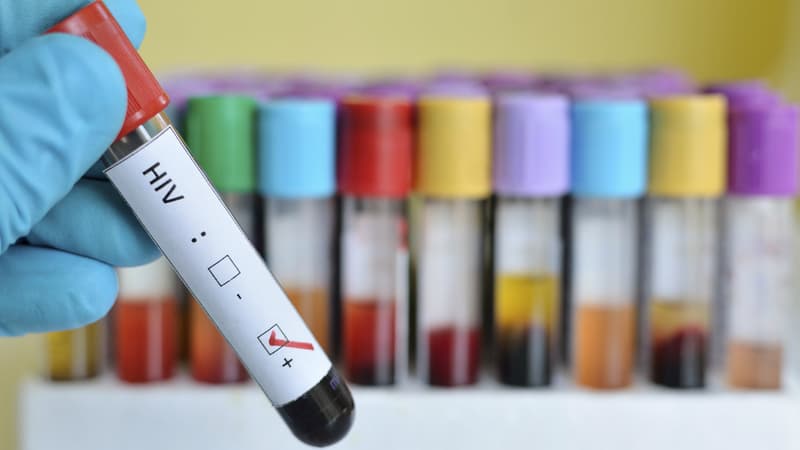Why could a vaccine against Covid-19 be on the market in less than a year, but still nothing against HIV? The fault lies with the strong mutation capacity of the virus and its innumerable subvariants.
“HIV is a retrovirus, meaning that the virus will integrate into cells and form part of the body, so it will be very difficult to eliminate,” Olivier Schwartz, head of the Virus and Immunity Area, begins by explaining to BFMTV.com. Unit of the Pasteur Institute.
The antibodies then have more difficulty adhering to the virus and preventing its multiplication. With its many “subtypes, the virus continues to quietly mutate and evolve,” it continues.
Where for the coronavirus vaccines do not prevent infection but rather serious forms of disease, for AIDS we want a vaccine that precisely protects against infection, Oliver Schwartz details.
This is the goal of vaccine research. “For four decades there have been many trials”, but if “clearly there is no product about to hit the market, there are new strategies”, reports the researcher.
tracks in action
“Among the candidate vaccines that went through phase 3 of clinical trials (the last phase of testing before the possible commercialization of a product), there was the trial in Thailand that had shown protection of approximately 30%”, but did not have impact on the development of the disease in infected vaccinated persons.
In France, the Vaccine Research Institute (VRI), which brings together ANRS, Inserm and the University of Paris-Est Créteil (UPEC), conducts research aimed at accelerating the development of effective vaccines.
A phase 1 vaccine trial against HIV infection was launched in February 2021, coordinated by Professor Yves Lévy. This vaccine is based on an innovative technology: the use of monoclonal antibodies designed to specifically target cells of the immune system called “dendritic cells”.
This is the first time that a vaccine has directly targeted these cells, which play an important role in activating the immune system.
This induction of “superantibodies” in the person by a vaccine aims to protect them from infection and “this is the main hope”, judges Víctor Appay, immunologist and director of research at Inserm with our colleagues from AFP. “A lot of research is being done to generate broad-spectrum antibodies, which will target as many strains of HIV as possible,” he adds.
HIV: how do you get the virus?
HIV is transmitted through the bodily fluids of an infected person (sperm, vaginal secretions, blood, breast milk…), but there is no transmission of the virus through contacts such as a kiss, a hug or sharing your plate.
It can be treated with antiretroviral treatment (ART), which also prevents transmission of the virus. But without treatment, HIV can progress to AIDS, often after many years.
There are treatments
Today, there is no way to eliminate the infection once HIV has been contracted, “but a treated person no longer transmits the virus”, so diagnosis is “the first step in prevention”, emphasizes Olivier Schwartz .
Developed in the 1990s, antiretroviral treatment (ART), which is taken daily for life, prevents the virus from reproducing in the body.
Antiretroviral treatment helps the infected person’s immune system get stronger, allowing it to fight other infections.
“If you are infected with HIV, in the absence of treatment, you develop AIDS, a deadly disease associated with a cachectic state (thin, editor’s note) and opportunistic infections. The immune system is no longer functional to protect against any type of infection or cancer,” explains Olivier Schwartz to BFMTV.com.
The treatment then allows the patient to reduce the amount of virus in their body, “which puts an end to the symptoms and allows those affected to lead a full and healthy life,” according to the World Health Organization.
“The WHO goal is ‘zero new infections’ by 2030… It sounds unrealistic, but it sets an ambitious public health direction, especially for countries in the Global South where the disease is still raging,” concludes Olivier Schwartz.
>> Where to do an HIV/AIDS screening test?
Source: BFM TV


